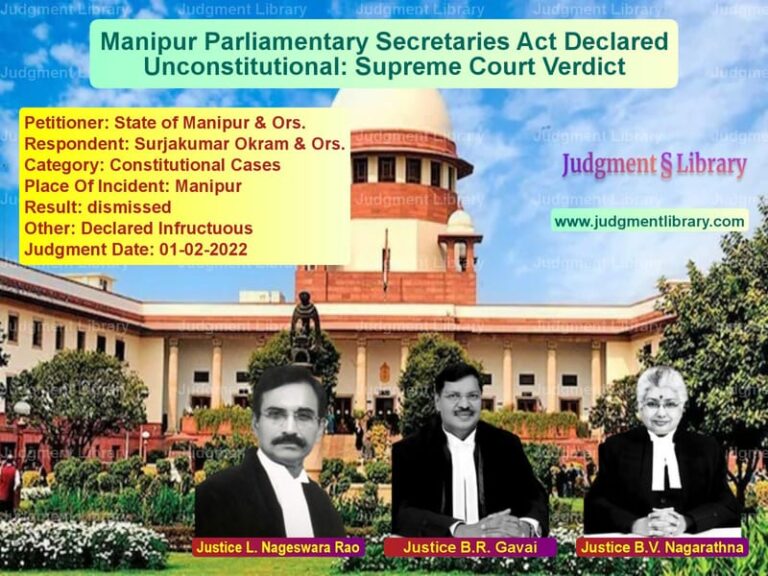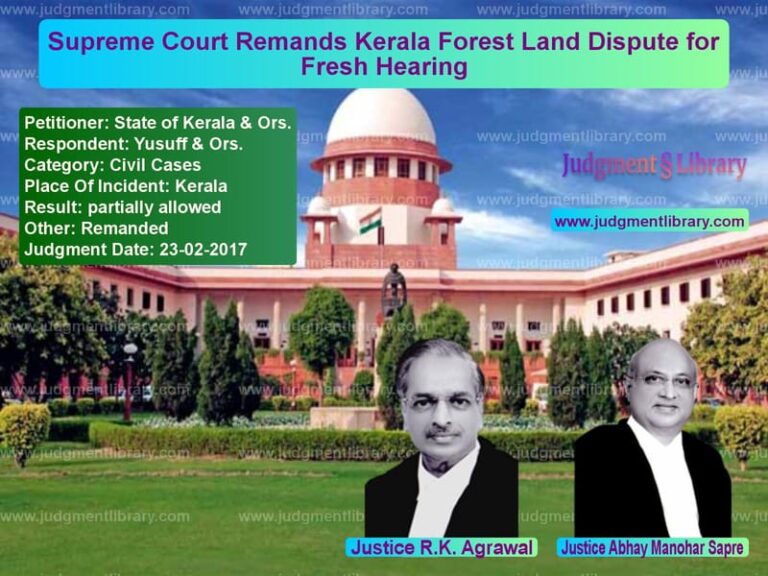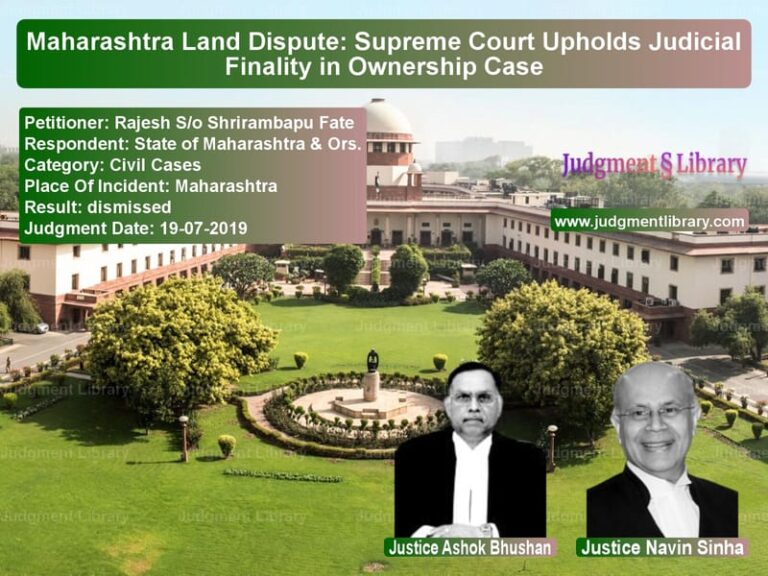Supreme Court Grants Exemption from Personal Appearance in 498A Dowry Case
The Supreme Court of India, in the case of Sri Rameshwar Yadav & Ors. vs. The State of Bihar & Anr., addressed the issue of personal appearance requirements in criminal proceedings under Section 498A of the Indian Penal Code (IPC) and the Dowry Prohibition Act. The Court ruled in favor of the accused and exempted them from appearing in person in every hearing, reinforcing the discretionary powers of Magistrates under Section 205 of the Code of Criminal Procedure (CrPC).
This ruling is significant for accused individuals who reside far from the jurisdiction of the trial court, ensuring that they are not unnecessarily burdened with personal appearances unless absolutely required.
Background of the Case
The case arose from a complaint filed by the second respondent (the complainant) against her husband, Arnesh Kumar, and other family members, alleging cruelty under Section 498A IPC and Section 4 of the Dowry Prohibition Act. The Sub-Divisional Judicial Magistrate, Patna, took cognizance of the complaint on October 11, 2012, and issued summons to all accused.
The appellants, who were the husband’s family members, were residing in Pune, Maharashtra, and sought exemption from personal appearance under Section 205 CrPC, citing the long distance and their professional commitments. However, the Magistrate rejected their plea on August 13, 2013, compelling them to challenge the order before the Patna High Court. The High Court also dismissed their application, leading to an appeal before the Supreme Court.
Claims of the Appellants (Accused)
- The appellants argued that they lived 1750 km away from Patna and had professional and educational obligations in Pune, making frequent travel to attend hearings impractical.
- They contended that the case primarily concerned the complainant’s husband, Arnesh Kumar, and their personal appearance was unnecessary.
- They had already obtained anticipatory bail, and there was no risk of evading trial.
- The Magistrate and the High Court failed to consider the discretionary powers under Section 205 CrPC to exempt personal appearance.
Claims of the Respondents (State and Complainant)
- The complainant opposed the exemption, arguing that personal appearances were necessary for reconciliation efforts.
- She contended that personal presence was essential in cases under Section 498A IPC and the Dowry Prohibition Act to ensure justice.
- The State argued that the accused had already appeared in court after securing bail, making further exemptions unnecessary.
Supreme Court’s Observations
Personal Appearance and Judicial Discretion
The Court analyzed Sections 205 and 317 CrPC and emphasized that Magistrates have the discretion to dispense with personal attendance when reasonable grounds exist. The Court stated:
“The Magistrate has the power to grant exemption from personal appearance if attending every hearing is impractical or causes undue hardship.”
Misinterpretation by the High Court
The Supreme Court criticized the High Court’s interpretation that applications under Section 205 CrPC must be filed at the first appearance itself. The Court ruled:
“The accused had already filed their application for exemption before appearing in court. The High Court’s observation that an application under Section 205 CrPC cannot be entertained after the first appearance is legally incorrect.”
Purpose of Section 498A IPC Cases
The Court noted that while Section 498A IPC cases aim to protect women from harassment, unnecessary hardship should not be imposed on the accused. It stated:
“Courts must balance the rights of the accused with the objectives of the legislation. Unwarranted personal appearances can lead to harassment of innocent family members.”
Final Judgment
- The Supreme Court allowed the appeal and set aside the orders of the Patna High Court and the Sub-Divisional Judicial Magistrate.
- The accused were granted exemption from personal appearance in trial proceedings.
- The Magistrate retained the authority to require personal attendance if deemed necessary.
Key Takeaways from the Judgment
- Discretion of Magistrates: Courts have the power to exempt an accused from personal appearances if justified.
- Protection from Harassment: Family members of accused persons should not be forced into unnecessary legal hardship.
- Balance Between Justice and Practicality: The ruling ensures that legal processes remain fair without causing undue difficulties.
- Judicial Review of Procedural Errors: The Supreme Court clarified misinterpretations of procedural law, ensuring justice is upheld.
Conclusion
The Supreme Court’s ruling in Sri Rameshwar Yadav & Ors. vs. The State of Bihar & Anr. sets an important precedent in cases related to Section 498A IPC. It reinforces the principle that courts must balance the need for justice with the rights of the accused, preventing unnecessary hardships while ensuring fair trials.
Petitioner Name: Sri Rameshwar Yadav & Ors.Respondent Name: The State of Bihar & Anr.Judgment By: Justice Ashok Bhushan, Justice A.K. SikriPlace Of Incident: Patna, BiharJudgment Date: 16-03-2018
Don’t miss out on the full details! Download the complete judgment in PDF format below and gain valuable insights instantly!
Download Judgment: Sri Rameshwar Yadav vs The State of Bihar & Supreme Court of India Judgment Dated 16-03-2018.pdf
Direct Downlaod Judgment: Direct downlaod this Judgment
See all petitions in SC/ST Act Case
See all petitions in Bail and Anticipatory Bail
See all petitions in Custodial Deaths and Police Misconduct
See all petitions in Judgment by Ashok Bhushan
See all petitions in Judgment by A.K. Sikri
See all petitions in allowed
See all petitions in Quashed
See all petitions in supreme court of India judgments March 2018
See all petitions in 2018 judgments
See all posts in Criminal Cases Category
See all allowed petitions in Criminal Cases Category
See all Dismissed petitions in Criminal Cases Category
See all partially allowed petitions in Criminal Cases Category







